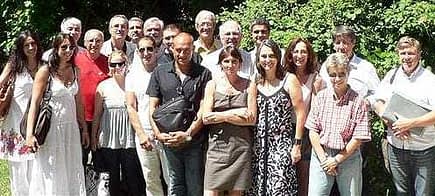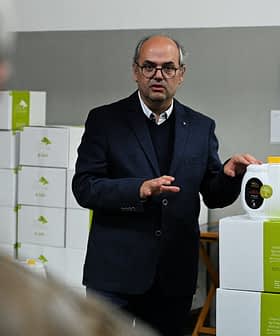In France, students can now obtain a Diplôme Universitaire (DU) d’Oléologie, or a university specialization diploma in olive oil.
Aiming to increase the number of olive oil professionals, a joint venture was set up by the Association Française Interprofessionelle de L’Olive (Afidol) and the Faculty of Pharmacy of the University of Montpellier.
Professor of chemistry, Alain Blaise, who helped set up the course is in charge of oenology – the science and technique of making and consuming wine — as well as oléologie, a relatively new word invented in France to describe the study of olive oil.
The chemical composition of olive oil and its characteristics are just as complex as wine. Professor Blaise said that the link between wine and now olive oil goes back to 1957 when chemists were called to study the chemical composition of wine, setting up norms for sugar levels and other components.
Montpellier University is the only university in France that offers a university level olive oil degree and one of the five universities that offer the more involved Diplôme National d’Oenologue for wine making. University olive oil programs are not so rare in Spain and Italy, where the sector is far larger than France’s.
Some of the students are viticulturists looking to diversify, but 90 percent of the students have olive orchards of their own. To get their diploma students, must follow in depth studies on
- The techniques involved in the transformation of olives, olive oil and olive based products
- The composition and analyses of olive oil
- Organoleptic assessment of olives and olive oil
- Hygiene, security of installations and maintaining quality
- Olive oil regulations in France and abroad
- Economy and marketing
- Nutrition and Health
.
Field trips to olive orchards and mills are included in the 220 hours, and enrollment each year is limited to 20 participants who pay 1,500 euros. (1,906 USD). Classes are held once a week from January to June ending with a three hour exam. To make sure students have a global knowledge, Professor Blaise invites fellow professors from abroad to share their expertise.
One of the first students to enroll when the course started in 2010 was Roland Coupat, owner of a 14 hectare olive orchard, Bastide du Laval. Although Roland has been producing AOC-recognized olive oil for 12 years and has taken different training courses, he still felt he needed more knowledge especially in practical and scientific skills.
“I was very pleased with the course — it was serious, it gave us direction and also, very beneficial, it provided us with key contacts so we could widen our knowledge,” he said.
Coupat, whose domaine is situated in the medieval village Cadenat in the Luberon region of Provence, is enthusiastic about the future: “I plan to be fully converted to bio by 2013… there will be lots of changes here,” he added.
Another participant in the 2010 promotion, Ann Desmaison, can now provide ongoing care for her 60 olive trees. She said: “the Diploma course covered everything from the chemistry of olive oil to the taste, olive orchards and diseases relating to olive growing, transformation of olives to marketing of olive oil, from genetics to olive oil regulations. I now have a global picture of all these parts.”
Her diploma allows her to sit as a member of the panel, and helping to maintain the high standard of organoleptic assessment of olive oils, for Concours Général Agricole – one of the premier olive oil competitions.
Now skilled in all aspects of olive oil cultivation, Desmaison offers one day seminars for olive oil enthusiasts. Working with the Discover Day deal, this olive oil expert takes participants through the process of making olive oil including field trips to orchards and a mill which uses both traditional and modern techniques. But what food enthusiasts really appreciate is the enthusiasm Desmaison shares with them when discussing the Mediterranean diet.
Desmaison said “nutritional facts, tasting and sharing are just as important, so by ending the day with a specially prepared menu, I demonstrate how to create harmonious flavors by pairing food with olive oil. That way they see just how versatile olive oil is in cooking, and they get a better understanding of extra virgin.”
With chemistry and sensory topics hot items these days, setting up such studies are positive strides for France. Besides improving proficiency and having more chemistry experts they are all part of educating the general public — all vital for promoting, monitoring and maintaining French standards.









